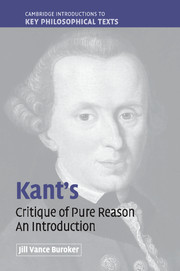Book contents
- Frontmatter
- Contents
- Acknowledgments
- List of abbreviations
- 1 Introduction to the critical project
- 2 The Prefaces and the Introduction
- 3 The Transcendental Aesthetic
- 4 The Metaphysical Deduction: identifying categories
- 5 The Transcendental Deduction of the categories
- 6 The Schematism and the Analytic of Principles I
- 7 The Analytic of Principles II
- 8 Transcendental illusion I: rational psychology
- 9 Transcendental illusion II: rational cosmology
- 10 Transcendental illusion III: rational theology
- 11 Reason and the critical philosophy
- Conclusion: Kant's transcendental idealism
- Works cited
- Index
2 - The Prefaces and the Introduction
Published online by Cambridge University Press: 05 June 2012
- Frontmatter
- Contents
- Acknowledgments
- List of abbreviations
- 1 Introduction to the critical project
- 2 The Prefaces and the Introduction
- 3 The Transcendental Aesthetic
- 4 The Metaphysical Deduction: identifying categories
- 5 The Transcendental Deduction of the categories
- 6 The Schematism and the Analytic of Principles I
- 7 The Analytic of Principles II
- 8 Transcendental illusion I: rational psychology
- 9 Transcendental illusion II: rational cosmology
- 10 Transcendental illusion III: rational theology
- 11 Reason and the critical philosophy
- Conclusion: Kant's transcendental idealism
- Works cited
- Index
Summary
THE A EDITION PREFACE: THE PROBLEM OF HUMAN REASON
In the first edition Preface Kant explains why a critique of human reason – the power to know – is necessary. At Avii he says it is the nature of reason to ask questions it cannot answer. Although he gives no examples, these questions are the basis of traditional metaphysical disputes Kant examines in the Transcendental Dialectic: is the universe finite or infinite in space and time? Is matter infinitely divisible or composed of simple parts? Do humans have free will or are we determined by causes outside our control? And does the existence of the universe presuppose a necessarily existent being? We can see how these questions arise in our everyday thinking. Consider the principle underlying scientific investigation: “Every event has a cause.” We “naturally” ask: what caused the earthquake? What causes the earth to revolve around the sun? What caused the universe? But if these questions arise naturally, then what is the problem?
In the Dialectic, Kant describes how, in trying to explain reality, reason ends up in a dilemma: either the explanatory chain continues forever, or it must end somewhere. The temptation is to find a stopping place, to invent an “absolute” to end the series. Examples of such “absolutes” are God as the cause of the universe, and freely acting souls as the causes of human actions. The problem with such answers is that they cannot be verified by experience.
- Type
- Chapter
- Information
- Kant's 'Critique of Pure Reason'An Introduction, pp. 14 - 35Publisher: Cambridge University PressPrint publication year: 2006



